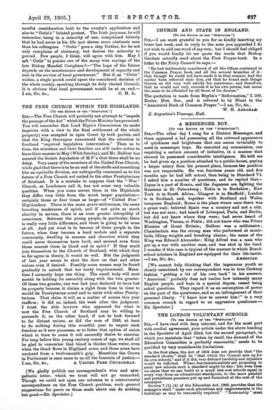(To TRH EDITOR 07 THE " SPECTATOR."] Sia,—The Free Church
will probably not attempt to "impede the passage of the Act" which the Prime Minister has promised. You will remember that Lord Elgin's Commission (to make inquiries with a vie* to the final settlement of the whole property) was accepted in open Court by both parties, and that the King thereupon announced that the situation in Scotland "required legislative intervention." Then as to time, the ministers and their families are still under notice to leave their manses in May (Whit-Sunday), and Mr. Balfour has assured the Scotch deputation of M.P.'s that there shall be no delay. Very many of the members of the United Free Church, while glad that there is to be an end of the strife and something like an equitable division, are unfeignedly concerned as to the future of a Free Church not united to the other Presbyterians of Scotland. It is a mistake to suppose that the " Wee " Church, as Londoners call it, has not some very valuable qualities. When you come across them in the Highlands they differ very little from the much larger population— certainly three or four times as large—of 0‘ United Free" Highlanders. There is the same grave enthusiasm, the same brooding tenderness of spirit, and if not quite so much alacrity in service, there is an even greater intrepidity of conscience. Between the young people, in particular, there is really very little difference, and there is going to be none at all. And yet what is to become of these people in the future, when they become a hard nodule and a separate community, dwelling in manses and churches which they could never themselves have built, and severed even from those nearest them in blood and in spirit ? If they could join themselves to the Church of Scotland, with which they so far agree in theory, it would be well. But the judgment of last year seems to shut the door on that and other unions even if desired. Possibly some means may be found gradually to unlock that too hasty imprisonment. Mean- time I earnestly hope one thing. The small body will next month be holding its assembly along with the two greater. Of these two greater, one was last year declared to have lost its property because it claims a right from time to time to mould its Presbyterian creed and to unite with other Presby- terians. That claim it will as a matter of course this year reaffirm ; it did so, indeed, the week after the judgment. I trust the able lawyers who appeared for what is now the Free Church of Scotland may be willing to persuade it, on the other hand, if not to look forward to far distant unions, as did the men of 1843, at least to do nothing during this eventful year to impair such freedom as it now possesses, or to fetter that option of union which in time to come it will assuredly desire to exercise. For long before this young century comes of age, we shall all be glad to remember that blood is thicker than water, even when the blood flows in Highland arms, and those arms have unclosed from a twelvemonth's grip. Meantime the Crown in Parliament is once more to us all the fountain of justice.— I am, Sir, &c., A UNITED FREE CHURCHMAN.
[We gladly publish our correspondent's wise and sym- pathetic letter, which we trust will not go unmarked. Though we could not open our -columns to a controversial correspondence on the Free Church problem, such general suggestions for peace as those made above can do nothing but good.—ED. Spectator.)


















































 Previous page
Previous page